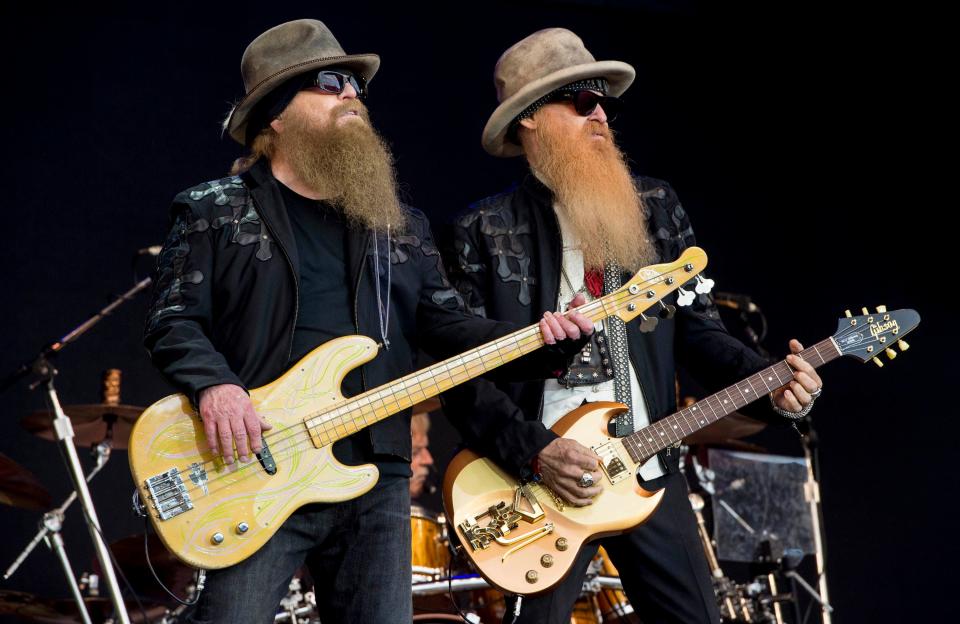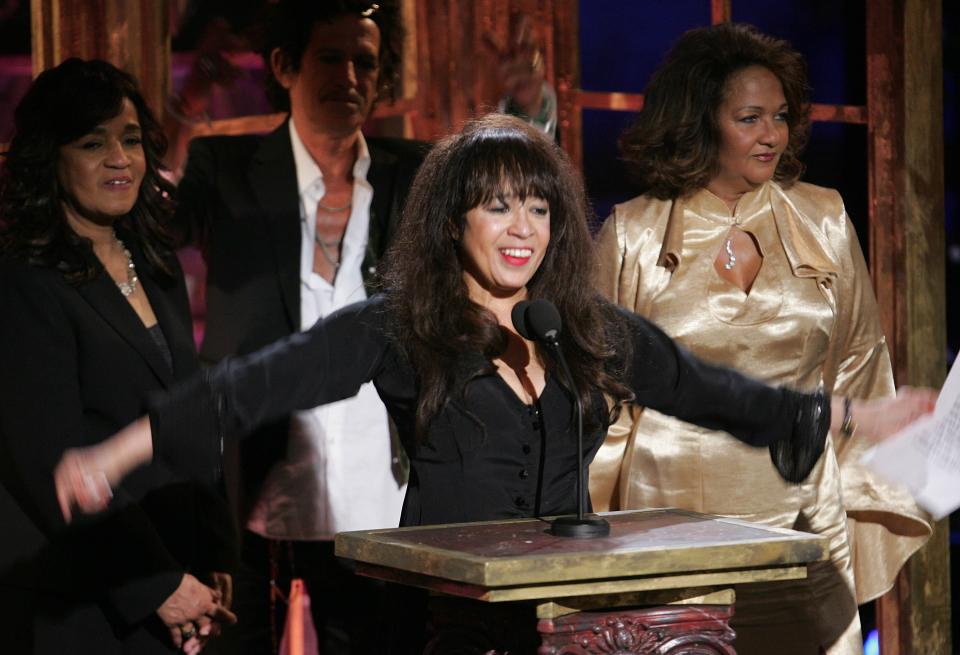COVID-19 is robbing musicians of their final chapter – and fans of their swan song performances
- Oops!Something went wrong.Please try again later.
- Oops!Something went wrong.Please try again later.
When the great R&B singer Ronnie Spector died on Jan. 12, the Rock and Roll Hall of Fame and Museum in Cleveland enacted its ritual. The building’s flag got lowered, Spector's music was played all day, and her photos and artifacts took center stage.
CEO Greg Harris is tired of it: “We’ve lowered our flag too many times over the last two years,” he says.
A dual tragedy has played out since the pandemic hit in early 2020.
There’s the drumbeat of obituaries for aging musicians whose rock, country and jazz hits shook, rattled and rolled the culture. Little Richard, Bill Withers, John Prine, Chick Corea, Charley Pride, ZZ Top's Dusty Hill, Michael Nesmith, Mary Wilson of The Supremes, Charlie Daniels and Charlie Watts, to name but a few.
But there is also, frustratingly for artists and fans alike, a complete upending of whatever plans the surviving veteran musicians had for their final chapter.
The sound of money: Why major musicians are selling their catalogs for millions
Consider legends like Buddy Guy, 85, whose concerts celebrating Chicago blues have been repeatedly canceled. And Elton John, 74, who has been trying to bid adieu since 2018, finally resuming his Goodbye Yellow Brick Road tour this week in New Orleans after a two-year break. Or Rod Stewart, who was blunt about the virus robbing him of a date with fans Down Under.
“My dear friends, once again I feel we’ve all been cheated by this evil disease,” Stewart said in a recent statement after having to bail on concerts in New Zealand and Australia amid omicron’s surge. “I’m absolutely gutted with disappointment.”
Many icons no doubt share Sir Rod’s sentiment.
“Artists are surely thinking, ‘As I get older, I’m more vulnerable, so will I ever get to do this again?’ ” says Sirius XM DJ Meg Griffin, who has plied the airwaves since the 1970s. "The pandemic truly threatens both their ability to get out there and our ability to see them again."
Fans don't shy away from expressing a mix of emotions on social media. Sometimes it's criticism of an artist for canceling or rescheduling to an inconvenient date. Other times the ire is directed at the virus itself. But mostly it's just a profound sense of disappointment and frustration.
Billy Joel tweeted recently that his Jan. 14 residency show at New York's Madison Square Garden – originally rescheduled for May 2, 2020 – was being changed yet again, to Aug. 24. Fans from England already had bought plane tickets. Another wasn't sure about getting child care for the new date. While some applauded Joel for trying to keep fans safe, few were happy.
"I understand the caution, but I’m so sad! I built my NYC Bucket List trip around the @billyjoel concert on my birthday," tweeted @gotcha42.
Added @monikalorah with a crying emoji: "We can’t do a Wednesday night reschedule either so I guess a refund it is and maybe I’ve seen my last Billy Joel concert ever."
Billy Joel concert review: Return to Madison Square Garden stocked with hits, realizations
I am so sad 😭 I understand but am sad. We can’t do a Wednesday night reschedule either so I guess a refund it is and maybe I’ve seen my last Billy Joel concert ever 🤷🏼♀️😢
— Monika (@monikalorah) January 7, 2022
A telling smile on John Hiatt's face
During a lull in the pandemic over the fall, Griffin decided to rekindle that concert thrill by attending a John Hiatt show. The club crowd was beaming, she says. As was 69-year-old Hiatt.
“For so many musicians, not letting them play is like removing their air supply," she says. "After being starved of not playing for people, there's this release, a higher level of joy. Honestly, it seemed that John was almost going to get teary."
The same could be said for live music fans. The sense of absence is profound. A recent Morning Consult poll shows that only 13% of music fans would feel comfortable going to a concert in the next month.
For nearly 1 in 4 respondents, concert attendance was most likely six or more months out, the poll found. That's a long wait for an experience many music lovers had come to take for granted.
“Quite simply, the experience of sitting in the audience watching musicians play is electric and not replaceable by anything else,” says Bob Spitz, author of “Led Zeppelin: The Biography,” who soon will turn to chronicle the Rolling Stones’ history.
While listening to recordings provides joy and connection to a favorite artist, "those little mistakes and interactions that happen when musicians play live are discoveries that we fans are missing out on," he says.
It's also something musicians may be missing out on, given that many don't feel as free to gather in the studio during the pandemic, says Spitz, who early in his career worked as a manager for Bruce Springsteen and Elton John.
Meat Loaf dies: 'Bat Out of Hell' and 'I'd Do Anything for Love' rock star dead at 74

"Without the ability to work in direct conjunction with other musicians, you lose a lot of spontaneity that makes great music," he says. “You can’t get it by phoning in or Zooming in your part.”
But the forced exile from public performances has done even more damage to those who make the music.
Spitz references a musician friend in his 80s who just lost all his concert dates because of the resurgent pandemic. “He feels his life is over. For guys like this, you’re at a complete loss.”
Pandemic brings 'end game' into focus
USA TODAY reached out to representatives of a few iconic rock heroes, but none were inclined to talk about the pandemic-fueled disappointment inherent in their final career phase. Perhaps it’s all too raw. Perhaps there’s still hope the virus will recede and performances will resume apace.
For younger musicians and their followers, that hope will spring eternal. But to crib from the Rolling Stones, for many older icons and fans, time is not on their side.
'We think about him every minute of every day': Charlie Watts remembered in Rolling Stones tour

“I have spoken to important vintage artists in past months, people who aren’t quite at the point of wrapping up their careers but close, and they’re just not going out because they’re scared” of getting the virus, says Anthony DeCurtis, a veteran Rolling Stone writer who has penned books on Lou Reed and Clive Davis. “I can only imagine that that kind of thinking is pervasive right now.”
DeCurtis says the recent rash of catalog sales by famous musicians and bands – ZZ Top, Bruce Springsteen, Stevie Nicks, John Legend, Shakira, the estate of David Bowie all reaped big rewards off their work – may also be driven by the pandemic.
There’s both more time now to sort through such matters with touring on hold, as well as a sense that perhaps this is the moment to reap and distribute such hard-earned wealth, he says.
“The pandemic has made people aware of the end game,” says DeCurtis.
But while cashing in is one thing, there is still the matter of performance – an ageless ritual that generates a high that only those who command thousands of singing fans can experience.
Do you need to be vaccinated to go to a concert? It depends

“Most of these artists are past the point of making their greatest work, so going out and performing these songs now to an audience is such an important way for them to connect using their music,” says DeCurtis. “But that’s not happening, and it’s upsetting for them.”
Rockers, fans: Cherish every live gig
For Rock Hall CEO Harris, our current state of affairs remains a waiting game, one increasingly punctuated by those lowered-flag moments.
It's a waiting game both for musicians hoping to have one last say from the stage if the virus loosens its grip and for fans eager to pay tribute in person.
Many did so last fall, when the Rock Hall got back to presenting an induction ceremony with live performances.
By all accounts, it was a raucous party celebrating inductees such as Tina Turner, Billy Preston and Carole King, featuring performances by Dave Grohl, Eminem, LL Cool J, and Taylor Swift. There was even an awed Paul McCartney, who prefaced his Foo Fighters induction speech by saying, “It’s like all of the people we’ve heard tonight. I mean, it’s just unbelievable. I feel super-privileged to be here.”
Charley Pride: A sketch of country music’s humble trailblazer, through the eyes of his son

Part of it could have been the stellar company. But most of it likely was just being able to get up on a stage and sing for a big crowd.
“There was extra energy and extra appreciation in that room that night, no question,” says Harris.
The only reliable course of action now for both musicians and fans is to grab these now-elusive opportunities when they arise, and savor every tuneful second.
Back when the Stones almost defiantly declared their Watts-less tour would go on as planned, DeCurtis weighed his own personal pros and cons.
“I thought, ‘Do I want to get on a plane and fly to Pittsburgh and go see a big show?' Well, not really,” he says. “But, hey, it’s the Stones. So I decided, ‘I’m there, I’m going.’ And you know what, I’m so glad I did.”
'They weren't breaking up': Here's why Peter Jackson's 'Get Back' defies Beatles history
This article originally appeared on USA TODAY: COVID robs legendary musicians of final tours, rewriting rock history

